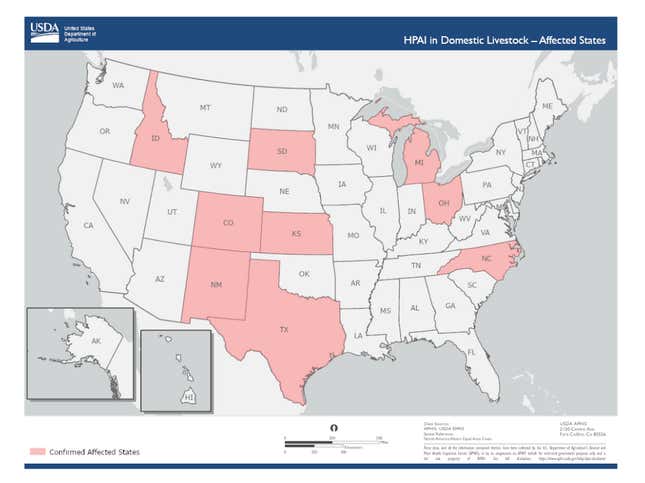The state of Michigan reported its first human case of H5N1, commonly called the bird flu, on Wednesday according to a press release from Michigan Health and Human Services. It’s just the third human case ever detected in the U.S. and the second of the current outbreak that has alarmed public health officials who are concerned about the potential for the virus to mutate.
The new case in Michigan involves a dairy worker with “mild symptoms,” according to state officials, and the current risk to the general public “remains low.”
The first human case of H5N1 in the U.S. was detected in Colorado in 2022 when a poultry farm worker contracted the virus. The second human case in the U.S., and the first of this current outbreak, happened in Texas around April 1 when a farm worker presumably became infected by cattle.
Previously, bird flu had only been transmitted directly from birds to other animals, but the Texas case was the first known instance of the virus being transmitted between mammals. Dozens of dairy herds have been detected in nine states, though farm owners have reportedly been trying to hide infections from federal authorities.
News outlet NOTUS recently quoted a dairy farmer in Texas who said he didn’t believe bird flu is real, telling the reporter, “You must be listening to CNN or something. Fake news.”
The virus is spreading rapidly in Michigan, with three more infected dairy herds detected, according to a report from the state’s Department of Agriculture and Rural Development on Monday. And while the current nationwide outbreak is concerning, it’s not like health experts didn’t see this coming. When more bird flu cases started popping up in mammals in 2023, the World Health Organization took note, issuing a warning about the disease.

State officials in Michigan have stressed they have the situation well monitored, and are keeping tabs as best they can with an evolving situation.
“Michigan has led a swift public health response, and we have been tracking this situation closely since influenza A (H5N1) was detected in poultry and dairy herds in Michigan,” Dr. Natasha Bagdasarian, chief medical executive for the state, said in a statement published online. “Farmworkers who have been exposed to impacted animals have been asked to report even mild symptoms, and testing for the virus has been made available.”
Importantly, there hasn’t been any case of H5N1 jumping between humans, and with any luck, it will stay that way.
“The current health risk to the general public remains low. This virus is being closely monitored, and we have not seen signs of sustained human-to-human transmission at this point,” said Bagdasarian.
Testing of milk from infected cows has shown bird flu to become inactive thanks to pasteurization, but raw milk can contain the active virus. Disturbingly, some people have started drinking raw milk recently under the mistaken belief it will give them “immunity” from the virus. Do not drink raw milk in an effort to protect yourself from bird blue because that’s not how immunity works. And this is just about the worst time to attempt those kind of DIY experiments.

